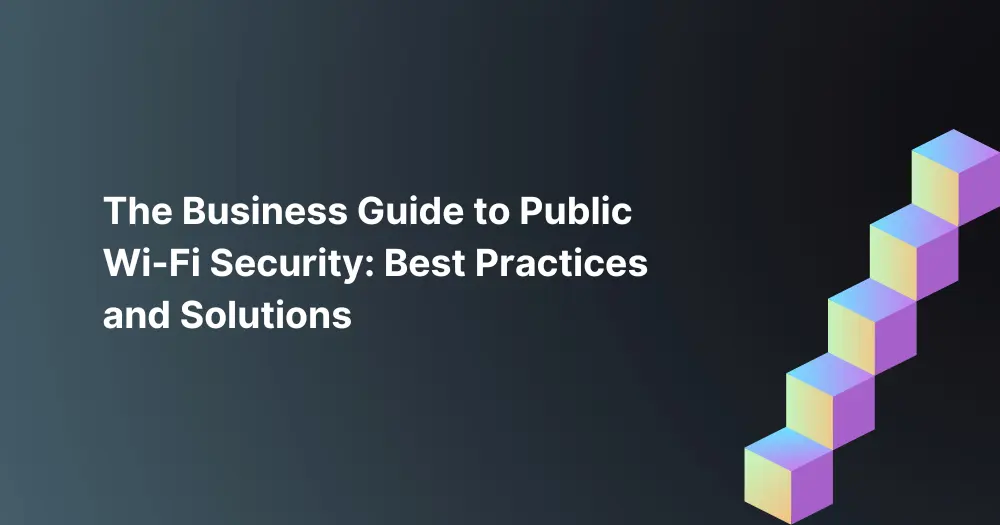
In an era dominated by smart devices, remote work, and online communication, staying connected is more important than ever. Wi-Fi supports various activities, including work, communication, social interactions, and entertainment, effectively connecting people, and facilitating various tasks. As the dependence on public Wi-Fi networks increases, businesses need to be mindful of the associated risks of employees using one. Understanding these risks helps adopt necessary precautions, maintain personal and professional data security, and avoid potential threats such as identity theft or cyberattacks. Doing so ensures the protection of their confidential data and fosters customer trust by providing a secure online environment.
The blog discusses how public Wi-Fi networks pose security risks and suggests practical solutions for businesses to provide a secure online experience for their employees and customers.
Public Wi-Fi networks, which offer internet access to users without requiring a personal subscription, can be found in various locations. These networks are commonly provided by businesses and public spaces to attract customers or enhance user experience. Public Wi-Fi networks deliver convenience and connectivity; however, users should be cautious when using them, as their security may not be as robust as private networks.
Typical Dangers of Using Public Wi-Fi:
Insecure Wi-Fi refers to networks that lack proper encryption and authentication measures, making them vulnerable to attacks. Vulnerable Wi-Fi networks can cause significant adverse effects for businesses, which include:
1. Educate Employees on Wi-Fi Security
A crucial step in guaranteeing secure usage of public Wi-Fi networks involves educating employees about the potential risks and providing them with strategies to mitigate these dangers. The following points should be addressed during this training:
2. Leveraging Virtual Private Networks (VPN) for Enhanced Security
A VPN encrypts your internet connection, ensuring heightened security and privacy. Utilizing VPN enables businesses to safeguard their data from potential interception by hackers on public Wi-Fi networks. The key advantages of using a VPN are:
Several VPN services are available, each with different features and pricing structures. Businesses should choose a VPN that best suits their needs and budget.
3. Enable Firewall and Antivirus Protection
Firewalls act as a defense between your device and the internet to block unauthorized access to your network. Antivirus software identifies and eliminates malicious software from your devices. Both firewalls and antivirus protection are indispensable for preserving a secure online experience. Businesses should take the following measures:
4. Use HTTPS Connections for Secure Web Browsing
When browsing the internet, it’s crucial to prioritize websites that utilize Hypertext Transfer Protocol Secure (HTTPS), as this protocol encrypts data transmitted between your device and the website. By taking this action, you can significantly increase the level of security for sensitive information like login details and personal data to prevent potential interception by cybercriminals. HTTPS offers several key benefits that contribute to a safer online experience:
1. Wi-Fi Security Protocols
Wi-Fi security protocols provide encryption and authentication for wireless networks. WPA3 is the most recent protocol, offering substantial enhancements in security and privacy. Businesses should prioritize upgrading their networks to support WPA3 or, at the very least, WPA2.
2. Network Segmentation
Network segmentation involves separating public Wi-Fi networks from internal networks that contain sensitive data. This lessens the risk of unauthorized access to critical systems and data. Benefits of network segmentation for businesses include:
3. Secure Password Policies
Strong passwords are important for protecting your Wi-Fi network and online accounts. Businesses should implement password policies that require the following:
4. Mobile Device Management (MDM) Solutions
Integrating a robust Mobile Device Management (MDM) system enables companies to effectively manage and safeguard employee devices, particularly when connected to public Wi-Fi networks. MDM solutions enable businesses to:
1. Conduct Regular Security Audits
Performing regular security audits helps you detect weaknesses in your Wi-Fi network and ensure your security measures are current. Businesses can hire professionals to conduct or perform these audits in-house, depending on their resources and expertise.
2. Keep Software and Firmware Updated
Outdated software and firmware can expose your Wi-Fi network to security risks. Businesses should make sure to:
Companies must understand the security hazards of public Wi-Fi networks and identify efficient methods to safeguard their information. This includes implementing best practices and investing in strong Wi-Fi security measures to ensure a secure online experience for employees and customers.
Partnering with a cybersecurity provider can help businesses secure their networks and protect customer data from any vulnerabilities. This helps to protect the company’s sensitive information from being intercepted by malicious actors or hackers. Additionally, working with a cybersecurity provider can help businesses stay updated on the latest technologies and hacks to protect their networks from future threats better. Security providers perform regular security assessments and generate reports to identify vulnerabilities in the system. They can also offer guidance to businesses on enhancing their security measures. This helps ensure that businesses are adequately protected from cyberattacks and malicious activities.
BlackPoint IT is committed to assisting you in establishing a safe and secure setting for your networks and data, allowing you to concentrate on growing your business. Our comprehensive cybersecurity solutions help keep your business safe from cyber threats. Contact us today and discover the multitude of ways our cutting-edge solutions can defend your business from cyber threats. Don’t wait — let us help you secure your network today!